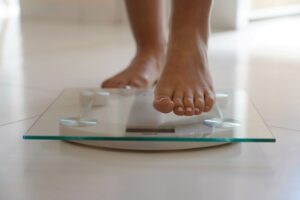
Many people are looking to lose weight in the new year. If you are among them, you may be thinking about how you can modify your eating habits and physical activity routine to reach your goals. But you should also think about the quality of your sleep! If you have sleep apnea, it may be very difficult to slim down unless you first receive proper treatment. Just how are weight and sleep apnea connected? This blog post explains.
Weight Gain and Sleep Apnea: A Vicious Cycle
Obesity is a major risk factor for obstructive sleep apnea (OSA). If you have extra fatty tissue around your neck and abdomen, it can place pressure on your airway. As a result, you are more likely to experience the breathing disruptions that are characteristic of OSA.
Of course, the relationship between weight and sleep apnea is a two-way street. Sleep apnea can make it difficult to lose weight or even maintain your weight because:
- Poor quality sleep can drain you of the energy you need to stick to a good exercise routine.
- Low-quality sleep can disrupt your hormone health. For example, you may have higher levels of the hunger hormone, ghrelin, and lower levels of the satiety hormone, leptin. Your body’s response to insulin may also be affected. You may be much more prone to snack on sugary and starchy items that are high in calories and low in nutritional value.
Reaching Your Health and Fitness Goals
While the above information is concerning, it does not mean that you cannot reach your health and fitness goals. Here are some tips that might help:
- Pay attention to the quality of your sleep. You may need to undergo sleep apnea testing. Once you are diagnosed, you can explore your treatment options.
- Be consistent with your treatment. As you use your sleep apnea treatment, you might find that it is easier to adhere to a reasonable weight loss plan.
- Do not ignore nutrition. Calorie count is just one aspect of losing weight. Try to center your diet on nutritious, satisfying, and tasty foods. A dietician may be able to help you come up with a reasonable eating plan.
- Enjoy moderate physical activity. Physical activity can promote high-quality sleep and support a healthy metabolism. Even exercising just 3 – 4 times a week can have huge benefits!
- Be patient. Caring for your health and fitness should be viewed as a lifelong journey. Be patient with yourself, and consult with qualified professionals as you continually make adjustments to your self-care plan.
Unwanted weight gain and sleep apnea often go hand in hand! Take steps to address both of these issues so you can optimize your health and your quality of life.
Meet the Practice
At Glastonbury Dental Associates, our team features five talented dentists. We pride ourselves on providing top-quality care in a welcoming environment. Oral appliance therapy for sleep apnea is among the advanced services that we offer. To learn how we may be able to help you enjoy better rest, contact our office at 860-633-3671.
